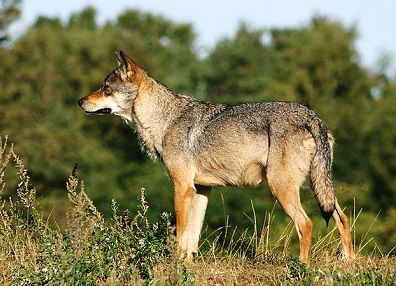The Danish Environmental Protection Agency issued a warning to nature photographers on Monday that using food to lure wild wolves into the ‘perfect picture’ is “dangerous”.
The warning comes after the agency board says it has learned of “several” photographers attempting to bait wolves in Denmark.
Photographers and other people should not feed wolves or their cubs to lure them or for pleasure, as it heightens the risk that wolves begin to associate people with food and become more outgoing, said the board in a statement.
Due to the size of the animals, that may lead to “dangerous situations”, said head of office at the Danish Environmental Protection Agency, Jens Skovager Østergaard.
Speaking to Ritzau, he declined to detail who has been trying to lure the wolves and where.
“But it is in connection with our wolf monitoring that there have been reports indicating that something like this is happening,” said Østergaard.
He added that the late summer is when new wolf pups venture out for the first time, and that feeding is particularly dangerous during this time.
Wolves in Denmark are only found in Jutland. There are between 32 and 43 adult wolves in the region, born no later than 2023, according to data from the Danish Environmental Protection Agency.
In July this year, there were eight pairs – at least six of whom have borne puppies in 2024.
“We have some young puppies on their way out into the countryside. They are more sensitive to habituation than adult wolves are. It is generally inappropriate to feed them,” said Østergaard.
A study by Aarhus University estimates that Danish habitats and natural food sources can support between 11 and 30 wolf pairs/couples, corresponding to a winter population of 77-210 wolves.
However, a wolf that lacks “instinctive shyness towards people” may attack dogs or domestic animals, or pose a danger to humans by exhibiting aggressive behavior or transmitting rabies.
The animals do not need human food, that it can even harm them in some cases, and can also attract rats, he adds.
More frequent attacks on livestock
Wolves are slowly repopulating Denmark. The species returned to Denmark in 2012 and by 2017 had a confirmed pack, according to the International Wolf Centre.
As the number of wolves in Denmark increases, the number of reported attacks on livestock is rising, according to the Danish Environmental Protection Agency.
In 2023, there were a total of 57 cases in which one or more wolves attacked livestock, up from 32 in 2022, and 16 in 2021.
Each individual wolf attack is documented based on findings of DNA or based on the local wolf consultant’s assessment of the animals killed, said the agency in a press release in August.
“The increasing number of wolf attacks on livestock follows the increasing wolf population and the fact that the wolves have spread to new areas,” says specialist consultant Lasse Jensen from the Danish Environmental Protection Agency.
Danish wolves’ primary prey is deer game such as roe deer and roe deer.
Wolf-proof fences work
In 2024, a subsidy scheme for wolf protection fences was been extended to the whole of Jylland.
There have been no documented attacks on livestock protected by a functioning wolf-proof fence, says the agency.
“Now farmers throughout Jutland can get subsidies to protect their livestock behind wolf-proof fences. Before, it was only possible in two limited areas in West and Central Jutland. We expect that the spread of wolf-proof fences will limit the number of wolf attacks on livestock in the long term,” added Jensen.
Wolf-proof fencing is higher than normal fencing, and usually has a live wire close to the ground.
The Danish Environmental Protection Agency compensates farmers for loss of livestock caused by wolf attacks.















